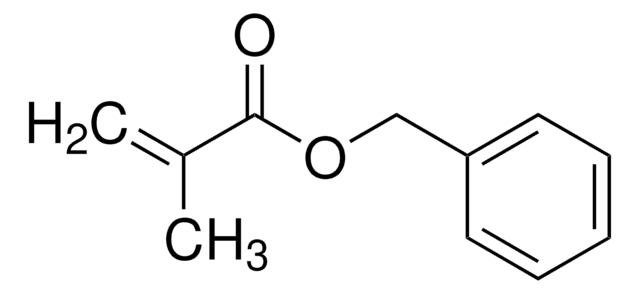900650
(3-Methacryloxy-2-hydroxypropoxy)propylbis(trimethylsiloxy)methylsilane
95%
Synonym(s):
SiGMA
Sign Into View Organizational & Contract Pricing
All Photos(1)
About This Item
Empirical Formula (Hill Notation):
C17H38O6Si3
CAS Number:
Molecular Weight:
422.74
MDL number:
UNSPSC Code:
12162002
NACRES:
NA.23
Recommended Products
Quality Level
Assay
95%
form
liquid
storage temp.
2-8°C
SMILES string
[Si](O[Si](C)(C)C)(O[Si](C)(C)C)(CCCOCC(O)COC(=O)C(=C)C)C
InChI
1S/C17H38O6Si3/c1-15(2)17(19)21-14-16(18)13-20-11-10-12-26(9,22-24(3,4)5)23-25(6,7)8/h16,18H,1,10-14H2,2-9H3
InChI key
NBOCBWJUDBATAS-UHFFFAOYSA-N
Related Categories
Application
3-Methacryloxy-2-hydroxypropoxy)propylbis(trimethylsiloxy)methylsilane (SiGMA) is a siloxane macromere, which can be used in the formation of hydrogels for the preparation of contact lenses.
This monomer is commonly used in the formulation of research silicone hydrogel contact lenses and other research ophthalmic devices. Silicone monomers are preferred for the synthesis of research ophthalmic materials due to their high oxygen permeability.
Storage Class Code
10 - Combustible liquids
WGK
WGK 3
Flash Point(F)
230.0 °F
Flash Point(C)
110 °C
Choose from one of the most recent versions:
Certificates of Analysis (COA)
Lot/Batch Number
Don't see the Right Version?
If you require a particular version, you can look up a specific certificate by the Lot or Batch number.
Already Own This Product?
Find documentation for the products that you have recently purchased in the Document Library.
Customers Also Viewed
Preparation, material properties and antimicrobial efficacy of silicone hydrogel by modulating silicone and hydrophilic monomer
Chien H and Kuo C
Journal of Biomaterials Science. Polymer Edition, 30(12), 1050-1067 (2019)
Hydrophilic silicone hydrogels with interpenetrating network structure for extended delivery of ophthalmic drugs.
Wang J, et al.
Polymers for Advanced Technologies, 23(9), 1258-1263 (2012)
Carbon compositional analysis of hydrogel contact lenses by solid-state NMR spectroscopy
Rabiah NI, et al.
Solid State Nuclear Magnetic Resonance, 102, 47-52 (2019)
The development of biomaterials for contact lens applications: Effects of wear modality on materials design.
Tighe BJ and Mann A
Biomaterials and Regenerative Medicine in Ophthalmology (Second Edition), 369-399 (2016)
Our team of scientists has experience in all areas of research including Life Science, Material Science, Chemical Synthesis, Chromatography, Analytical and many others.
Contact Technical Service![3-[Tris(trimethylsiloxy)silyl]propyl methacrylate contains MEHQ + HQ as stabilizer, 98%](/deepweb/assets/sigmaaldrich/product/structures/148/664/33ff5116-f264-4a64-824a-009c2ca5b2b3/640/33ff5116-f264-4a64-824a-009c2ca5b2b3.png)




![2-[3-(2H-Benzotriazol-2-yl)-4-hydroxyphenyl]ethyl methacrylate 99%](/deepweb/assets/sigmaaldrich/product/structures/208/967/cf29567e-c125-41dc-b80a-66889fa1a679/640/cf29567e-c125-41dc-b80a-66889fa1a679.png)





